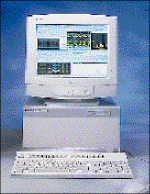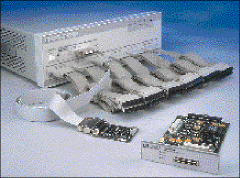Logic analyzers combine with emulation
to integrate hardware/software debugging
Hewlett-Packard (Palo Alto, CA), in response to the increasing complexity of the digital design process, has combined logic analysis and emulation under one roof in its HP 16700A and HP 16600A series of logic analysis systems. A complete view of the prototype under test, from hardware to software, is possible by way of analysis and emulation modules.
The mainframes address several challenges faced by digital design teams. These include the ever-increasing complexity and proliferation of new microprocessors, narrowing time frames to market, and the inability of traditional debugging tools to correlate hardware and software problems.
Logic analyzers lack debugging tools such as code download, target control, and reliable debugger connections. In-circuit emulators are intrusive and do not show system activity beyond the processor. Both tools are deemed expensive and dictate an independence between software and hardware designers.

Fig. 1. Expansion capabilities are offered by the HP 16700A and
HP 16701A mainframes with up to ten analysis and four emulation slots possible.
The HP 16700A (see Fig. 1 ) is a modular, high-performance platform for designers using leading-edge microprocessors in multiprocessor systems, core-based ASICs, or systems on silicon. The HP 16600A series (see Fig. 2 ) is a preconfigured system with built-in analysis capabilities. Both systems take advantage of on-chip debugging.

Fig. 2. The HP 16600A logic analyzer mainframes provide
up to 204 channels with one analysis and one emulation slot.
Providing five analysis and two emulation slots, the HP 16700A can be expanded to ten analysis and four emulation slots via the HP 16701A expansion frame. The HP 16600A/ 1A/2A/3A systems offer 204, 136, 102, and 68 channels, respectively, with one analysis and one emulation slot. Pricing for the six mainframes is $9,900, $5,000, $24,240, $18,040, $14,540, and $10,040, respectively, with a 4-week-ARO delivery time.
Both systems provide an intuitive multiwindow interface that allows viewing of the target system's operation. Multiple time-correlated views display hardware operation, source code, and cross-domain activity simultaneously, thereby allowing the entire design team to use one tool for debugging.
Several analysis modules are available for both series of mainframes. Users can choose either a 500-MHz/2-Gsample/s or 250-MHz/1-Gsample/s oscilloscope. State/timing modules with 16 channels, 64 Kbytes of memory, and sampling rates up to 4 Gsamples/s are provided. A 200-Mvector/s, 40-channel pattern generator with 252 Kbytes of memory is also available.
A specialized software analyzer toolset will correlate a logic analyzer trace to the source code that produced it. The logic analyzer trigger can be set up by pointing and clicking on that source code line. Other toolsets include a system performance analyzer that pinpoints software and hardware problems within a specified area of the circuit under test and a serial analyzer that acquires and displays serial data streams for peripheral equipment testing.
An emulation control interface provides processor controls such as run, stop, break, reset, chip register access, and the ability to download code to the target. Integrated debugger support is provided via a LAN 10Base-2 port through which third-party debugger tools can be acquired that will drive the Hewlett-Packard emulation module.
For microprocessors featuring on-chip emulation, a processor emulation module can be added to connect the on-board debugging resources of the processor to the logic analyzer. Analysis and bus probes for processors that do not have on-chip emulation are available for over 200 microprocessors and microcontrollers, and for PCI, USB, VXI, SCSI, and other bus architectures.
All products mentioned will be available this month. Analysis solutions start at $4,495 and emulation modules and probes start at $2,995 with four weeks ARO delivery time. All models in the series are upgradable and the company will provide support for future microprocessors, buses, and emulation tools as they become available. For more information from Hewlett-Packard, call 800-452-4844, ext. 5645, or visit http://www.hp.com/go/logicanalyzer.
–Mathew A. Dirjish
Advertisement





